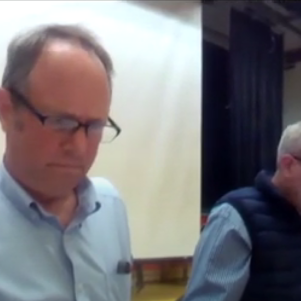Harvard defends itself in Title IX lawsuit
By Evan Lips | July 4, 2016, 6:43 EDT
 (Facebook)
(Facebook) BOSTON — Harvard University is not backing down from challenging a female graduate’s federal lawsuit claiming the school was negligent in adjudicating a sexual assault allegation in accordance to new Title IX policies.
In a motion to dismiss, attorneys representing the prestigious Ivy League institution claim the school did everything within its power to accommodate the accuser, Alyssa Leader, who graduated in December and alleges administrators refused her pleas to have the accused, a former boyfriend, moved out of the dormitory where they both lived.
The motion notes that administrators “offered to find Leader alternative housing to minimize contact with John Doe” and “explored the option” of enacting a no-contact order “which would have precluded John Doe and Leader from contacting each other.”
Leader turned down both offers, court filings show, instead insisting that her ex-boyfriend be relocated.
The filing of Leader’s lawsuit follows a turbulent period in higher education, one in which the U.S. Department of Education’s Office for Civil Rights under President Barack Obama has redefined standards for colleges and universities in terms of investigating allegations of sexual assault. In 2011 the Office for Civil Rights began issuing a series of “dear colleague” letters, advising colleges and universities that receive federal funding to change their adjudication policies.
Standards that had been in place largely relied upon a “clear and convincing evidence” and “proof beyond a reasonable doubt” framework. The new policy mandated by the federal government now requires colleges and universities to adopt “preponderance of the evidence” or “more likely than not” standards.
For higher education administrators, the transition has not been a smooth one. Most recently, an expelled Yale University student sued over his case, alleging a denial of basic due process rights. In addition, a federal judge overseeing a case involving Brandeis University denied the school’s motion to dismiss a lawsuit filed by a student after he too alleged due process deprivation.
Attorneys defending Harvard against Leader’s accusations claim the school did its fair share of due diligence, as “investigators met with or interviewed Leader six times, interviewed John Doe at least three times, talked with 17 other witnesses, and gathered and reviewed voluminous documentary evidence from Leader, John Doe, and the other witnesses, including text and e-mail messages.”
In its motion to dismiss, Harvard claims administrators showed “no deliberate indifference” and point to a series of previously decided cases as having set a precedent.
The cases cited by Harvard, however, were all ruled prior to the Obama administration’s new federally-mandated interpretation of Title IX laws.
“This is just such an ‘appropriate case,’” attorneys representing Harvard claim in the motion, however. “Considering the many actions that Leader herself claims Harvard took in response to her reports, she fails to plausibly allege that Harvard acted with the “deliberate indifference” necessary to state a Title IX claim.
“Leader does not dispute that Harvard took each of these steps (and others) in response to her reports concerning John Doe — rather, she alleges only that Harvard should have conducted its investigation differently, or provided her with remedial options more to her liking.”
Moreover, attorneys representing the school claim Leader failed to state a claim under Title IX laws. In addition, Harvard claims it adhered to the “preponderance of the evidence” standard throughout the investigation.
“Investigators ultimately concluded that they could not find, by a preponderance of the evidence, that John Doe had violated the policy’s prohibition against retaliation,” the motion states.
Read a copy of Harvard’s motion to dismiss:











